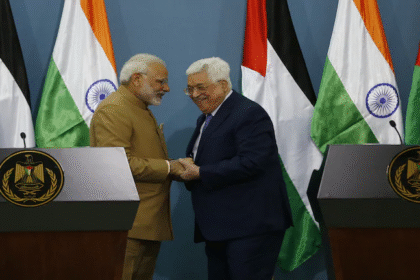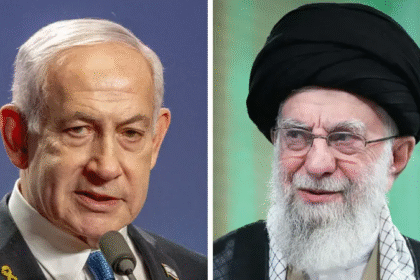5 Arab Gulf Nations Mobilize to Contain Fallout After Israel’s Major Strike on Iran
Oman and Qatar were leading efforts to begin ceasefire talks, while mediators said Iran was open to resuming nuclear negotiations if Israel’s attacks stop
Iranian officials have told mediators they are open to resuming nuclear talks with the United States, but they first want Israel to stop its attacks, two officials briefed on the matter said Monday, as fighting between the regional archrivals continued for a fourth day
Tehran’s position, one official said, was that, “we never left the negotiating table, but no negotiations while we are under fire.” Oman and Qatar were leading efforts to begin ceasefire talks, the second official said — part of a frantic drive by Persian Gulf states to tamp down the intensifying conflict on their doorstep that began Friday, when Israel began striking Iran. Both officials spoke on the condition of anonymity due to the sensitive nature of the discussions.
The escalating conflict has fed a growing dread in the Persian Gulf, fueled by the region’s proximity to the conflict, memories of terrible wars past and confusion over how far Israel, Iran and the Trump administration are willing to escalate. President Donald Trump on Monday indicated he had received messages that Iran was seeking to halt the fighting, but did not say whether he had asked Israel to stop or divulge whether the United States intended to intervene militarily on Israel’s behalf.
On Monday evening, Trump posted about the conflict on his social media site: “What a shame, and waste of human life,” he wrote. “Simply stated, IRAN CAN NOT HAVE A NUCLEAR WEAPON. I said it over and over again! Everyone should immediately evacuate Tehran!” It was unclear what prompted him to call for an evacuation of the city, which has a population of nearly 10 million.
If the conflict drags on, it may be inevitable that the gulf will somehow be dragged in, analysts said. On Monday, in another round of bloody strikes, an Iranian missile barrage struck the port city of Haifa, and Israel struck Iranian missile batteries as well as the headquarters of Iranian state television. At least 224 people in Iran and 24 people in Israel have been killed in the attacks since Friday, according to officials.

“We have been working for years to avert such a showdown, because we will be the ultimate victims,” said Bader al-Saif, a professor of history at Kuwait University, who described a sense of panic in the region as supermarket aisles started to empty and social media lit up with talk of bomb shelters.
For a time, gulf states had reason to hope they would be spared the conflict’s violent fallout. Some of the monarchies had pledged to Iran that they would not participate in attacks against it. And as a bloc, they kept lines of communication to all sides, having cultivated relations with both Iran and Israel as part of a recent gulf push to forge a security policy independent of the United States and insulate the region if war broke out.
Now, gulf states have been left to wonder what Prime Minister Benjamin Netanyahu’s government intends, as Israel broadens its target list and offers shifting accounts of its war aims: from degrading Iran’s nuclear program to welcoming, if not pushing for, regime change.
Gulf states are also bracing to see how Iran’s response will evolve, especially if it feels the government’s survival is at stake. The worries are for the days ahead — if Tehran lashes out at targets beyond Israel — and for the aftermath, amid fears that Iran, acutely aware of its insecurity, might double down on its nuclear program.
“Have the Israelis just provoked the Iranians in a rush to the bomb?” said Ali Shihabi, a Saudi author and political analyst. “Obviously, that’s a concern.”
There was the question, too, of whether the United States would join Israel in attacking Iran, which analysts said could lead to the most catastrophic and unpredictable of consequences for the country’s 90 million people and the region beyond.
“If America is wise, rational and prioritizes the interests of all in the region, it will not get involved and will force Israel to stop,” Hamoud Abu Talib wrote Monday in the Saudi daily Okaz.
If the United States was “lured in,” he added, “we will enter a phase worse than any the region has ever experienced.”
The Trump administration is already involved: as Israel’s main weapons supplier and by assisting in shooting down Iran’s missiles. As some of the president’s allies have urged him to intervene more forcefully on Israel’s behalf, Trump has continued to hold out the possibility of a nuclear deal with Iran, while also praising Israel’s strikes and threatening the “full strength and might” of the U.S. military if Iran attacks American interests.
On Monday, at the Group of Seven summit in Canada, Trump answered “yeah” when asked by reporters if mediators had signaled that Iran was seeking to end the conflict.
“They’d like to talk, but they should have done that before,” he said. “They should talk immediately before it’s too late.” Asked what it would take for the United States to intervene militarily, Trump responded, “I don’t want to talk about that.”
U.S. officials said Monday that the Pentagon was expanding its military presence in the Middle East and Europe, with a fleet of American refueling planes and an additional aircraft carrier among the resources dispatched. The move puts those aircraft closer to the region to defend U.S. interests if needed, said one official familiar with the discussion, who spoke on the condition of anonymity because of the issue’s sensitivity.
While Trump had been “unpredictable,” there was also a sense in the gulf that pledges the president made during a recent trip to the region — to strive for stability and ending wars — were part of his doctrine, Saif said. “He is tweeting about having peace and making the Middle East great again,” he said.
“He has leverage over Israel, and he needs to use it,” Saif added.
If the president was a wild card, there was more confidence that Tehran might not target its immediate neighbors — a result of warming ties, including between Saudi Arabia and Iran, after relations reached a nadir nearly a decade ago.
In April, Saudi Arabia’s defense minister, Khalid bin Salman, traveled to Tehran, a sign of thawing relations between the regional archrivals, where he delivered a message: that the Israelis were “looking for an excuse to attack” and that Iran should negotiate with the United States over its nuclear program, Shihabi said.
The Saudis also pledged that they would not “participate in any way” in military operations against Iran, he said.
“The gulf has built good ties with Iran over the last year or so, so I don’t think the Iranians want to put that at risk,” Shihabi said. The danger that Iran-allied groups in the region might act unilaterally had also been diminished, he said. “They have mostly been defanged except the Houthis,” a rebel militia in Yemen that had no desire to “start a fresh war,” he said.
Gulf entreaties to be left out of the fighting, though, would “depend on where the Iranian threat perception takes them,” Saif said. If the regime felt its existence was threatened, it could take more drastic measures — like blocking the Strait of Hormuz, a critical waterway, or attacking U.S. bases in the gulf.
“This is uncharted territory,” he said.
As the unknown unfolded, authorities in gulf states scrambled to reassure their nervous populations. In a message on X on Sunday, Qatar’s Ministry of Environment and Climate Change told citizens that “radiation levels in the air and territorial waters of the State of Qatar are within normal limits.” The ministry said it was closely monitoring such levels “around-the-clock.”
In Kuwait, the army issued a statement Monday confirming that the missile launches lighting up the nighttime sky in Iran and arcing toward Israel were not entering the country’s airspace and posed no threat.
Abdulkhaleq Abdulla, a political scientist in the United Arab Emirates, said the crisis had presented the gulf with “challenges and opportunities.”
A weakened Iran was “good for the region,” he said, citing Tehran’s funding of regional proxies and decades of “expansion.” But Israel was emerging “more emboldened” militarily, to the detriment of the region, including the Palestinians, whose plight “won’t be solved anytime soon,” he said.
The idea that Iran’s government would collapse was “wishful thinking in Tel Aviv and many quarters of the region,” he said. When the hostilities end, it is likely that Iran “is going to look inward” rather than try to project its power regionally, he said.
“Everyone is talking to everyone” to end the fighting, he said. “The phones are burning.”
Those who assumed people in the gulf were happy with the strikes against Iran “should think twice,” Saif said. “This is such an intertwined, interconnected region.”
An Israeli strike on Iran’s oil and gas industry Saturday impacted a gas field that Tehran shares with Qatar. The Bushehr nuclear power plant, which Israel has not targeted, on Iran’s western coast, sits less than 200 miles from Kuwait.
Read Also : Iran Launches Missile Strikes on Tel Aviv and Haifa: Israel Conflict Escalates into Day 4 with Major Attacks








